Filebeat之input和output(包含Elasticsearch Output 、Logstash Output、 Redis Output、 File Output和 Console Output)
前提博客
https://i.cnblogs.com/posts?categoryid=972313
Filebeat啊,根据input来监控数据,根据output来使用数据!!!
Filebeat的input
通过paths属性指定要监控的数据
Filebeat的output
1、Elasticsearch Output (Filebeat收集到数据,输出到es里。默认的配置文件里是有的,也可以去官网上去找)
2、Logstash Output (Filebeat收集到数据,输出到logstash里。默认的配置文件里是有的,也可以得去官网上去找)
3、Redis Output (Filebeat收集到数据,输出到redis里。默认的配置文件里是没有的,得去官网上去找)
4、File Output (Filebeat收集到数据,输出到file里。默认的配置文件里是有的,也可以去官网上去找)
5、Console Output (Filebeat收集到数据,输出到console里。默认的配置文件里是有的,也可以去官网上去找)
https://www.elastic.co/guide/en/beats/filebeat/1.3/filebeat-configuration-details.html
手把手教你看官网(如何查找并配置为自己的,以Redis Output为例)
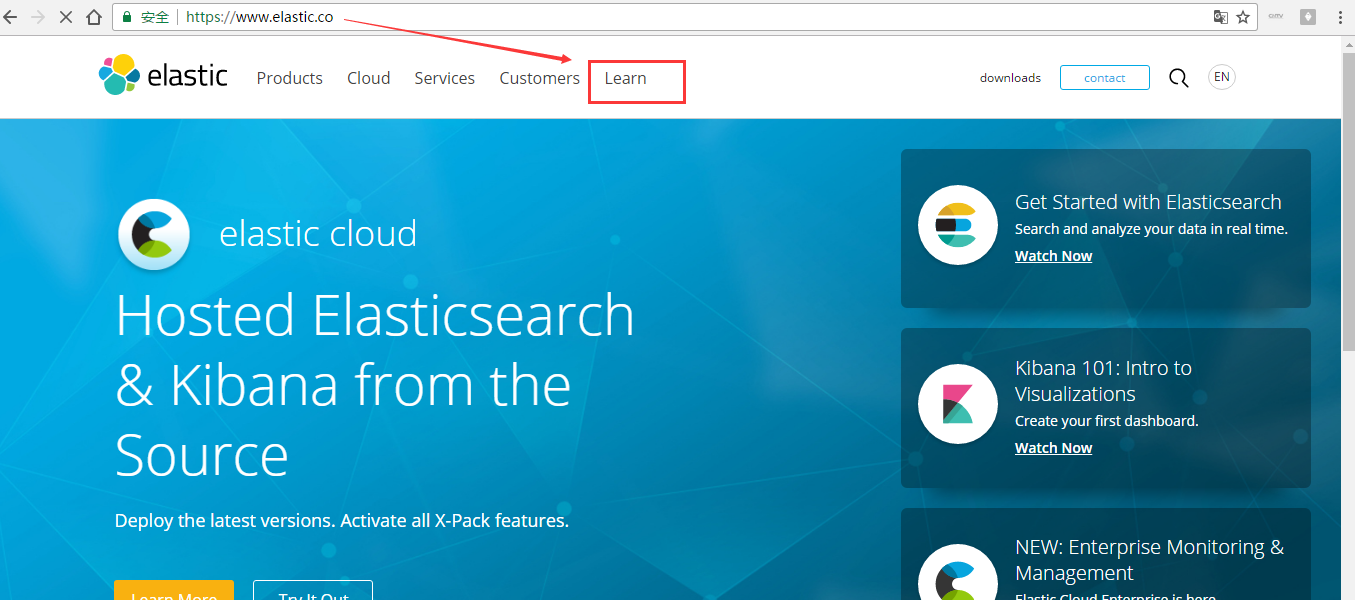
第二步:https://www.elastic.co/learn
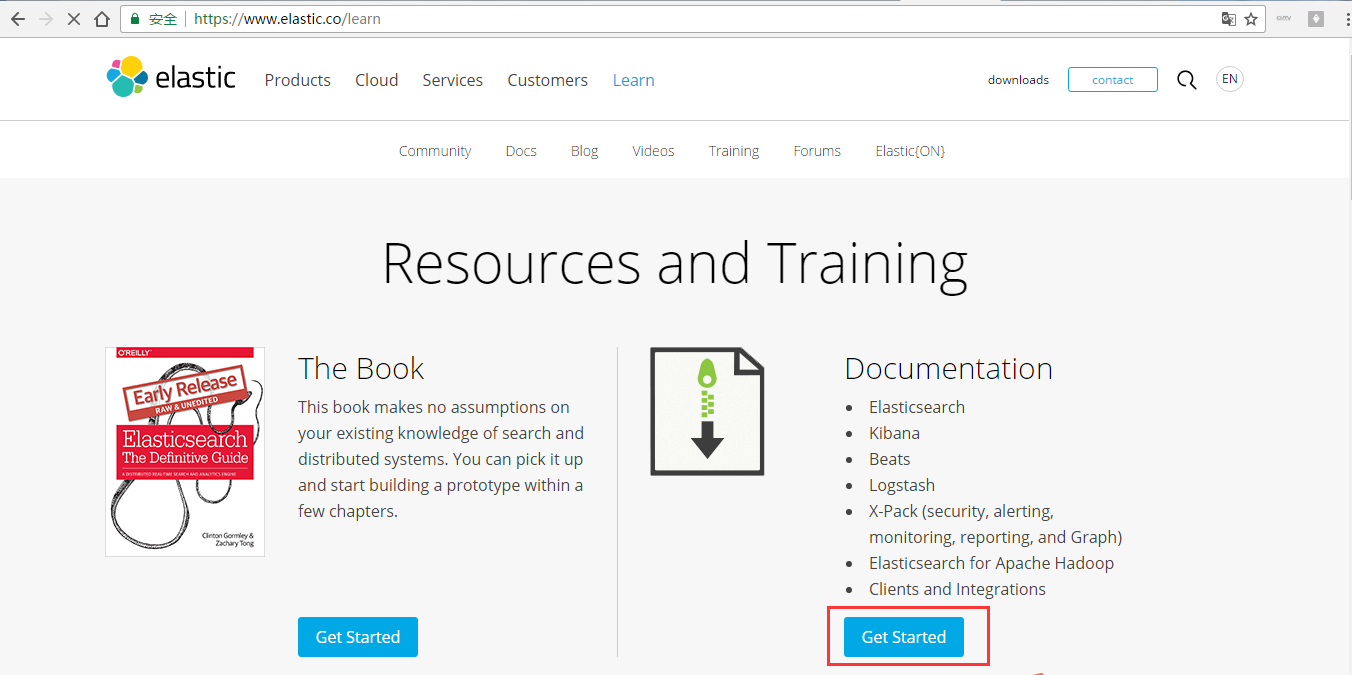
第三步: https://www.elastic.co/guide/index.html
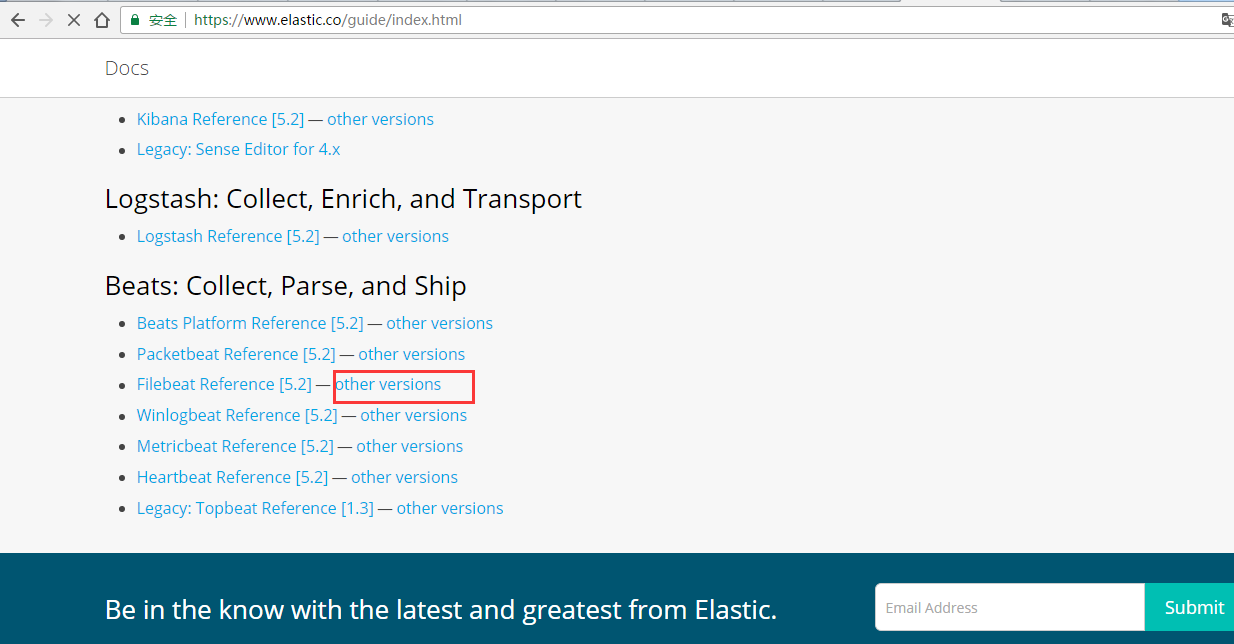
第四步: https://www.elastic.co/guide/en/beats/filebeat/index.html

第五步:https://www.elastic.co/guide/en/beats/filebeat/1.3/index.html
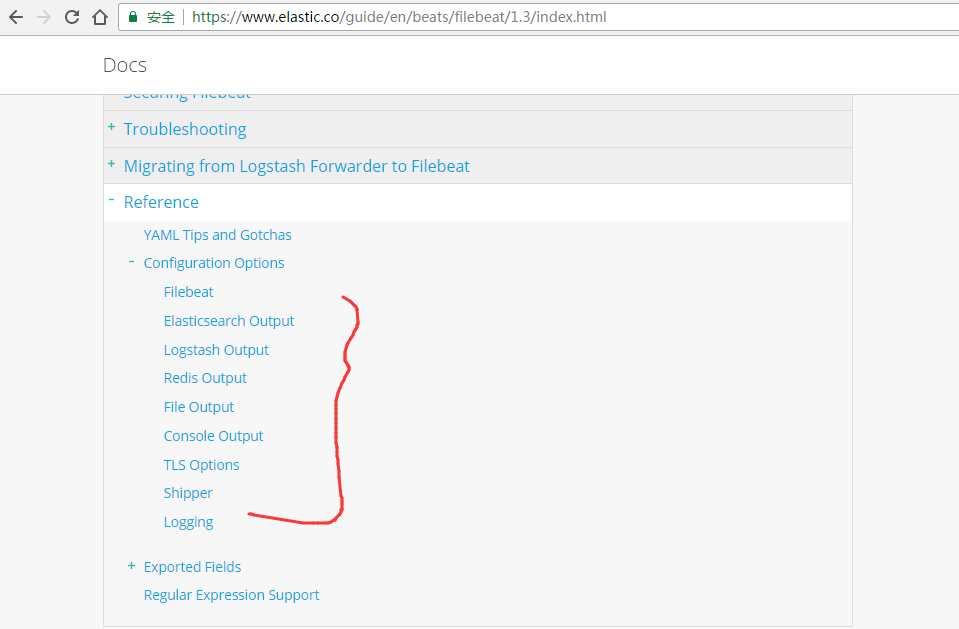
第六步:https://www.elastic.co/guide/en/beats/filebeat/1.3/redis-output.html

output:
redis:
# Set the host and port where to find Redis.
host: "localhost"
port: 6379 # Uncomment out this option if you want to store the topology in Redis.
# The default is false.
save_topology: true # Optional index name. The default is filebeat and generates filebeat keys.
index: "filebeat" # Optional Redis database number where the events are stored
# The default is 0.
db: 0 # Optional Redis database number where the topology is stored
# The default is 1. It must have a different value than db.
db_topology: 1 # Optional password to authenticate with. By default, no
# password is set.
# password: "" # Optional Redis initial connection timeout in seconds.
# The default is 5 seconds.
timeout: 5 # Optional interval for reconnecting to failed Redis connections.
# The default is 1 second.
reconnect_interval: 1
第七步:以上是官网提供的例子。
比如我的机器情况是:
HadoopMaster 安装了 Elasticsearch Logstash Kibana Filebeat
HadoopSlave1 安装了 Elasticsearch Filebeat
HadoopSlave2 安装了 Elasticsearch Filebeat redis

所以,我最后的
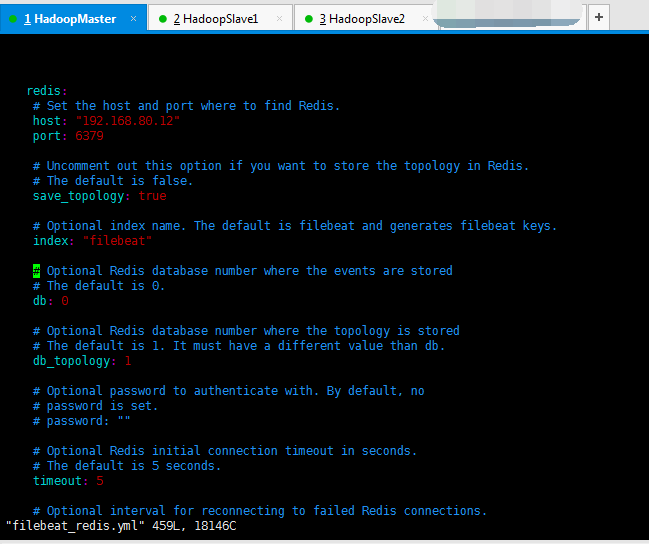
output:
redis:
# Set the host and port where to find Redis.
host: "192.168.80.12"
port: 6379 # Uncomment out this option if you want to store the topology in Redis.
# The default is false.
save_topology: true # Optional index name. The default is filebeat and generates filebeat keys.
index: "filebeat" # Optional Redis database number where the events are stored
# The default is 0.
db: 0 # Optional Redis database number where the topology is stored
# The default is 1. It must have a different value than db.
db_topology: 1 # Optional password to authenticate with. By default, no
# password is set.
# password: "" # Optional Redis initial connection timeout in seconds.
# The default is 5 seconds.
timeout: 5 # Optional interval for reconnecting to failed Redis connections.
# The default is 1 second.
reconnect_interval: 1
总结
1、Elasticsearch Output
启动redis
[hadoop@HadoopMaster filebeat-1.3.1-x86_64]$ pwd
/home/hadoop/app/filebeat-1.3.1-x86_64
[hadoop@HadoopMaster filebeat-1.3.1-x86_64]$ ./filebeat -c filebeat_es.yml
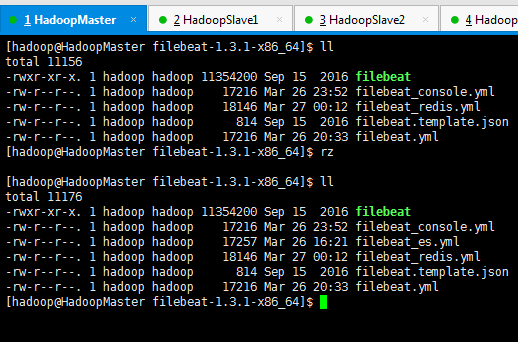
因为,我之前,在Elasticsearch里,进行过sheield权限插件的安装,虽然目前是30天试用期(因为这个插件是商业化的)。但是到期后先卸载,重新安装即可。很简单。
Elasticsearch之shield(权限)插件安装之后的浏览详解
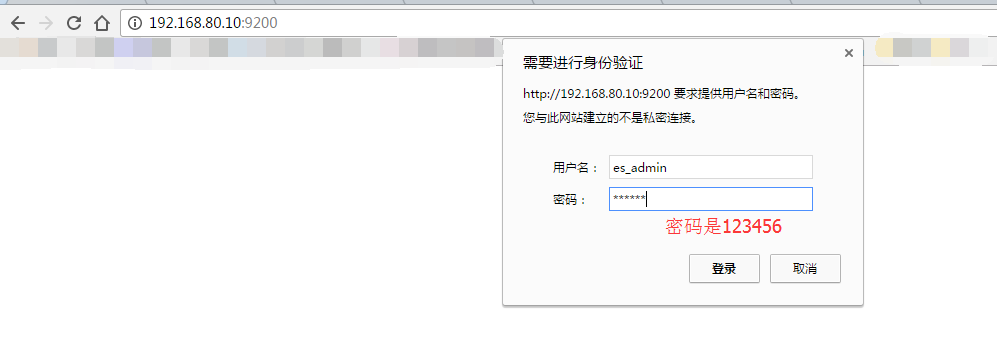
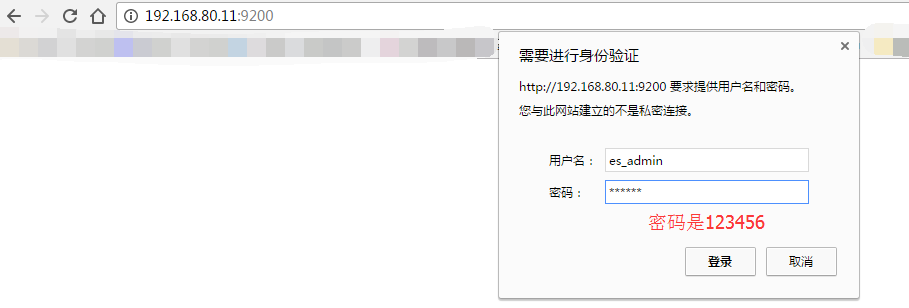

所以,我的自定义filebeat_es.yml才会如下。

################### Filebeat Configuration Example ######################### ############################# Filebeat ######################################
filebeat:
# List of prospectors to fetch data.
prospectors:
# Each - is a prospector. Below are the prospector specific configurations
-
# Paths that should be crawled and fetched. Glob based paths.
# To fetch all ".log" files from a specific level of subdirectories
# /var/log/*/*.log can be used.
# For each file found under this path, a harvester is started.
# Make sure not file is defined twice as this can lead to unexpected behaviour.
paths:
- /home/hadoop/app.log
#- c:\programdata\elasticsearch\logs\* # Configure the file encoding for reading files with international characters
# following the W3C recommendation for HTML5 (http://www.w3.org/TR/encoding).
# Some sample encodings:
# plain, utf-8, utf-16be-bom, utf-16be, utf-16le, big5, gb18030, gbk,
# hz-gb-2312, euc-kr, euc-jp, iso-2022-jp, shift-jis, ...
#encoding: plain # Type of the files. Based on this the way the file is read is decided.
# The different types cannot be mixed in one prospector
#
# Possible options are:
# * log: Reads every line of the log file (default)
# * stdin: Reads the standard in
input_type: log # Exclude lines. A list of regular expressions to match. It drops the lines that are
# matching any regular expression from the list. The include_lines is called before
# exclude_lines. By default, no lines are dropped.
# exclude_lines: ["^DBG"] # Include lines. A list of regular expressions to match. It exports the lines that are
# matching any regular expression from the list. The include_lines is called before
# exclude_lines. By default, all the lines are exported.
# include_lines: ["^ERR", "^WARN"] # Exclude files. A list of regular expressions to match. Filebeat drops the files that
# are matching any regular expression from the list. By default, no files are dropped.
# exclude_files: [".gz$"] # Optional additional fields. These field can be freely picked
# to add additional information to the crawled log files for filtering
#fields:
# level: debug
# review: 1 # Set to true to store the additional fields as top level fields instead
# of under the "fields" sub-dictionary. In case of name conflicts with the
# fields added by Filebeat itself, the custom fields overwrite the default
# fields.
#fields_under_root: false # Ignore files which were modified more then the defined timespan in the past.
# In case all files on your system must be read you can set this value very large.
# Time strings like 2h (2 hours), 5m (5 minutes) can be used.
#ignore_older: 0 # Close older closes the file handler for which were not modified
# for longer then close_older
# Time strings like 2h (2 hours), 5m (5 minutes) can be used.
#close_older: 1h # Type to be published in the 'type' field. For Elasticsearch output,
# the type defines the document type these entries should be stored
# in. Default: log
#document_type: log # Scan frequency in seconds.
# How often these files should be checked for changes. In case it is set
# to 0s, it is done as often as possible. Default: 10s
#scan_frequency: 10s # Defines the buffer size every harvester uses when fetching the file
#harvester_buffer_size: 16384 # Maximum number of bytes a single log event can have
# All bytes after max_bytes are discarded and not sent. The default is 10MB.
# This is especially useful for multiline log messages which can get large.
#max_bytes: 10485760 # Mutiline can be used for log messages spanning multiple lines. This is common
# for Java Stack Traces or C-Line Continuation
#multiline: # The regexp Pattern that has to be matched. The example pattern matches all lines starting with [
#pattern: ^\[ # Defines if the pattern set under pattern should be negated or not. Default is false.
#negate: false # Match can be set to "after" or "before". It is used to define if lines should be append to a pattern
# that was (not) matched before or after or as long as a pattern is not matched based on negate.
# Note: After is the equivalent to previous and before is the equivalent to to next in Logstash
#match: after # The maximum number of lines that are combined to one event.
# In case there are more the max_lines the additional lines are discarded.
# Default is 500
#max_lines: 500 # After the defined timeout, an multiline event is sent even if no new pattern was found to start a new event
# Default is 5s.
#timeout: 5s # Setting tail_files to true means filebeat starts readding new files at the end
# instead of the beginning. If this is used in combination with log rotation
# this can mean that the first entries of a new file are skipped.
#tail_files: false # Backoff values define how agressively filebeat crawls new files for updates
# The default values can be used in most cases. Backoff defines how long it is waited
# to check a file again after EOF is reached. Default is 1s which means the file
# is checked every second if new lines were added. This leads to a near real time crawling.
# Every time a new line appears, backoff is reset to the initial value.
#backoff: 1s # Max backoff defines what the maximum backoff time is. After having backed off multiple times
# from checking the files, the waiting time will never exceed max_backoff idenependent of the
# backoff factor. Having it set to 10s means in the worst case a new line can be added to a log
# file after having backed off multiple times, it takes a maximum of 10s to read the new line
#max_backoff: 10s # The backoff factor defines how fast the algorithm backs off. The bigger the backoff factor,
# the faster the max_backoff value is reached. If this value is set to 1, no backoff will happen.
# The backoff value will be multiplied each time with the backoff_factor until max_backoff is reached
#backoff_factor: 2 # This option closes a file, as soon as the file name changes.
# This config option is recommended on windows only. Filebeat keeps the files it's reading open. This can cause
# issues when the file is removed, as the file will not be fully removed until also Filebeat closes
# the reading. Filebeat closes the file handler after ignore_older. During this time no new file with the
# same name can be created. Turning this feature on the other hand can lead to loss of data
# on rotate files. It can happen that after file rotation the beginning of the new
# file is skipped, as the reading starts at the end. We recommend to leave this option on false
# but lower the ignore_older value to release files faster.
#force_close_files: false # Additional prospector
#-
# Configuration to use stdin input
#input_type: stdin # General filebeat configuration options
#
# Event count spool threshold - forces network flush if exceeded
#spool_size: 2048 # Enable async publisher pipeline in filebeat (Experimental!)
#publish_async: false # Defines how often the spooler is flushed. After idle_timeout the spooler is
# Flush even though spool_size is not reached.
#idle_timeout: 5s # Name of the registry file. Per default it is put in the current working
# directory. In case the working directory is changed after when running
# filebeat again, indexing starts from the beginning again.
#registry_file: .filebeat # Full Path to directory with additional prospector configuration files. Each file must end with .yml
# These config files must have the full filebeat config part inside, but only
# the prospector part is processed. All global options like spool_size are ignored.
# The config_dir MUST point to a different directory then where the main filebeat config file is in.
#config_dir: ###############################################################################
############################# Libbeat Config ##################################
# Base config file used by all other beats for using libbeat features ############################# Output ########################################## # Configure what outputs to use when sending the data collected by the beat.
# Multiple outputs may be used.
output: ### Elasticsearch as output
elasticsearch:
# Array of hosts to connect to.
# Scheme and port can be left out and will be set to the default (http and 9200)
# In case you specify and additional path, the scheme is required: http://localhost:9200/path
# IPv6 addresses should always be defined as: https://[2001:db8::1]:9200
hosts: ["192.168.80.10:9200","192.168.80.11:9200","192.168.80.12:9200"] # Optional protocol and basic auth credentials.
protocol: "https"
username: "es_admin"
password: "123456" # Number of workers per Elasticsearch host.
#worker: 1 # Optional index name. The default is "filebeat" and generates
# [filebeat-]YYYY.MM.DD keys.
index: "filebeat" # A template is used to set the mapping in Elasticsearch
# By default template loading is disabled and no template is loaded.
# These settings can be adjusted to load your own template or overwrite existing ones
#template: # Template name. By default the template name is filebeat.
#name: "filebeat" # Path to template file
#path: "filebeat.template.json" # Overwrite existing template
#overwrite: false # Optional HTTP Path
#path: "/elasticsearch" # Proxy server url
#proxy_url: http://proxy:3128 # The number of times a particular Elasticsearch index operation is attempted. If
# the indexing operation doesn't succeed after this many retries, the events are
# dropped. The default is 3.
#max_retries: 3 # The maximum number of events to bulk in a single Elasticsearch bulk API index request.
# The default is 50.
#bulk_max_size: 50 # Configure http request timeout before failing an request to Elasticsearch.
#timeout: 90 # The number of seconds to wait for new events between two bulk API index requests.
# If `bulk_max_size` is reached before this interval expires, addition bulk index
# requests are made.
#flush_interval: 1 # Boolean that sets if the topology is kept in Elasticsearch. The default is
# false. This option makes sense only for Packetbeat.
#save_topology: false # The time to live in seconds for the topology information that is stored in
# Elasticsearch. The default is 15 seconds.
#topology_expire: 15 # tls configuration. By default is off.
tls:
# List of root certificates for HTTPS server verifications
certificate_authorities: ["/etc/pki/root/ca.pem"] # Certificate for TLS client authentication
certificate: "/etc/pki/client/cert.pem" # Client Certificate Key
certificate_key: "/etc/pki/client/cert.key" # Controls whether the client verifies server certificates and host name.
# If insecure is set to true, all server host names and certificates will be
# accepted. In this mode TLS based connections are susceptible to
# man-in-the-middle attacks. Use only for testing.
#insecure: true # Configure cipher suites to be used for TLS connections
#cipher_suites: [] # Configure curve types for ECDHE based cipher suites
#curve_types: [] # Configure minimum TLS version allowed for connection to logstash
#min_version: 1.0 # Configure maximum TLS version allowed for connection to logstash
#max_version: 1.2 ### Logstash as output
#logstash:
# The Logstash hosts
#hosts: ["localhost:5044"] # Number of workers per Logstash host.
#worker: 1 # The maximum number of events to bulk into a single batch window. The
# default is 2048.
#bulk_max_size: 2048 # Set gzip compression level.
#compression_level: 3 # Optional load balance the events between the Logstash hosts
#loadbalance: true # Optional index name. The default index name depends on the each beat.
# For Packetbeat, the default is set to packetbeat, for Topbeat
# top topbeat and for Filebeat to filebeat.
#index: filebeat # Optional TLS. By default is off.
#tls:
# List of root certificates for HTTPS server verifications
#certificate_authorities: ["/etc/pki/root/ca.pem"] # Certificate for TLS client authentication
#certificate: "/etc/pki/client/cert.pem" # Client Certificate Key
#certificate_key: "/etc/pki/client/cert.key" # Controls whether the client verifies server certificates and host name.
# If insecure is set to true, all server host names and certificates will be
# accepted. In this mode TLS based connections are susceptible to
# man-in-the-middle attacks. Use only for testing.
#insecure: true # Configure cipher suites to be used for TLS connections
#cipher_suites: [] # Configure curve types for ECDHE based cipher suites
#curve_types: [] ### File as output
#file:
# Path to the directory where to save the generated files. The option is mandatory.
#path: "/tmp/filebeat" # Name of the generated files. The default is `filebeat` and it generates files: `filebeat`, `filebeat.1`, `filebeat.2`, etc.
#filename: filebeat # Maximum size in kilobytes of each file. When this size is reached, the files are
# rotated. The default value is 10 MB.
#rotate_every_kb: 10000 # Maximum number of files under path. When this number of files is reached, the
# oldest file is deleted and the rest are shifted from last to first. The default
# is 7 files.
#number_of_files: 7 ### Console output
#console:
# Pretty print json event
#pretty: false ############################# Shipper ######################################### shipper:
# The name of the shipper that publishes the network data. It can be used to group
# all the transactions sent by a single shipper in the web interface.
# If this options is not defined, the hostname is used.
#name: # The tags of the shipper are included in their own field with each
# transaction published. Tags make it easy to group servers by different
# logical properties.
#tags: ["service-X", "web-tier"] # Uncomment the following if you want to ignore transactions created
# by the server on which the shipper is installed. This option is useful
# to remove duplicates if shippers are installed on multiple servers.
#ignore_outgoing: true # How often (in seconds) shippers are publishing their IPs to the topology map.
# The default is 10 seconds.
#refresh_topology_freq: 10 # Expiration time (in seconds) of the IPs published by a shipper to the topology map.
# All the IPs will be deleted afterwards. Note, that the value must be higher than
# refresh_topology_freq. The default is 15 seconds.
#topology_expire: 15 # Internal queue size for single events in processing pipeline
#queue_size: 1000 # Configure local GeoIP database support.
# If no paths are not configured geoip is disabled.
#geoip:
#paths:
# - "/usr/share/GeoIP/GeoLiteCity.dat"
# - "/usr/local/var/GeoIP/GeoLiteCity.dat" ############################# Logging ######################################### # There are three options for the log ouput: syslog, file, stderr.
# Under Windos systems, the log files are per default sent to the file output,
# under all other system per default to syslog.
logging: # Send all logging output to syslog. On Windows default is false, otherwise
# default is true.
to_syslog: false # Write all logging output to files. Beats automatically rotate files if rotateeverybytes
# limit is reached.
to_files: true # To enable logging to files, to_files option has to be set to true
files:
# The directory where the log files will written to.
path: /home/hadoop/mybeat # The name of the files where the logs are written to.
name: mybeat # Configure log file size limit. If limit is reached, log file will be
# automatically rotated
rotateeverybytes: 10485760 # = 10MB # Number of rotated log files to keep. Oldest files will be deleted first.
keepfiles: 7 # Enable debug output for selected components. To enable all selectors use ["*"]
# Other available selectors are beat, publish, service
# Multiple selectors can be chained.
#selectors: [ ] # Sets log level. The default log level is error.
# Available log levels are: critical, error, warning, info, debug
level: debug
2、Logstash Output
启动redis
[hadoop@HadoopMaster filebeat-1.3.1-x86_64]$ pwd
/home/hadoop/app/filebeat-1.3.1-x86_64
[hadoop@HadoopMaster filebeat-1.3.1-x86_64]$ ./filebeat -c filebeat_logstash.yml
因为,我这里,安装Logstash,在192.168.80.10上,具体,请移步
Logstash安装(图文详解)(多节点的ELK集群安装在一个节点就好)
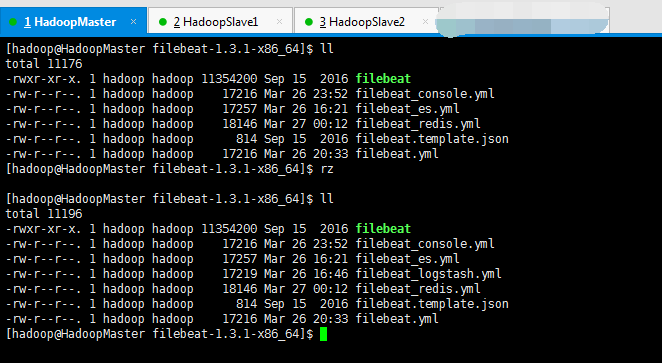
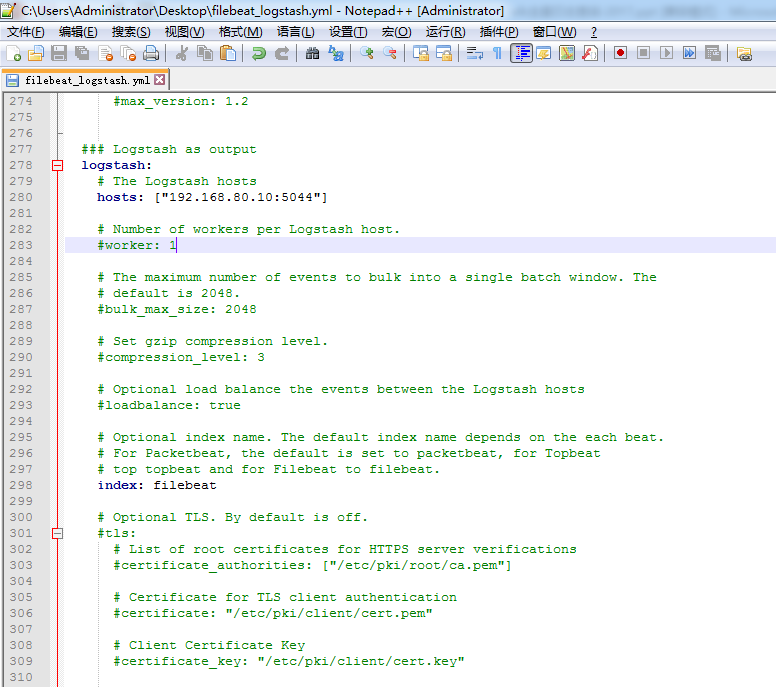
################### Filebeat Configuration Example ######################### ############################# Filebeat ######################################
filebeat:
# List of prospectors to fetch data.
prospectors:
# Each - is a prospector. Below are the prospector specific configurations
-
# Paths that should be crawled and fetched. Glob based paths.
# To fetch all ".log" files from a specific level of subdirectories
# /var/log/*/*.log can be used.
# For each file found under this path, a harvester is started.
# Make sure not file is defined twice as this can lead to unexpected behaviour.
paths:
- /home/hadoop/app.log
#- c:\programdata\elasticsearch\logs\* # Configure the file encoding for reading files with international characters
# following the W3C recommendation for HTML5 (http://www.w3.org/TR/encoding).
# Some sample encodings:
# plain, utf-8, utf-16be-bom, utf-16be, utf-16le, big5, gb18030, gbk,
# hz-gb-2312, euc-kr, euc-jp, iso-2022-jp, shift-jis, ...
#encoding: plain # Type of the files. Based on this the way the file is read is decided.
# The different types cannot be mixed in one prospector
#
# Possible options are:
# * log: Reads every line of the log file (default)
# * stdin: Reads the standard in
input_type: log # Exclude lines. A list of regular expressions to match. It drops the lines that are
# matching any regular expression from the list. The include_lines is called before
# exclude_lines. By default, no lines are dropped.
# exclude_lines: ["^DBG"] # Include lines. A list of regular expressions to match. It exports the lines that are
# matching any regular expression from the list. The include_lines is called before
# exclude_lines. By default, all the lines are exported.
# include_lines: ["^ERR", "^WARN"] # Exclude files. A list of regular expressions to match. Filebeat drops the files that
# are matching any regular expression from the list. By default, no files are dropped.
# exclude_files: [".gz$"] # Optional additional fields. These field can be freely picked
# to add additional information to the crawled log files for filtering
#fields:
# level: debug
# review: 1 # Set to true to store the additional fields as top level fields instead
# of under the "fields" sub-dictionary. In case of name conflicts with the
# fields added by Filebeat itself, the custom fields overwrite the default
# fields.
#fields_under_root: false # Ignore files which were modified more then the defined timespan in the past.
# In case all files on your system must be read you can set this value very large.
# Time strings like 2h (2 hours), 5m (5 minutes) can be used.
#ignore_older: 0 # Close older closes the file handler for which were not modified
# for longer then close_older
# Time strings like 2h (2 hours), 5m (5 minutes) can be used.
#close_older: 1h # Type to be published in the 'type' field. For Elasticsearch output,
# the type defines the document type these entries should be stored
# in. Default: log
#document_type: log # Scan frequency in seconds.
# How often these files should be checked for changes. In case it is set
# to 0s, it is done as often as possible. Default: 10s
#scan_frequency: 10s # Defines the buffer size every harvester uses when fetching the file
#harvester_buffer_size: 16384 # Maximum number of bytes a single log event can have
# All bytes after max_bytes are discarded and not sent. The default is 10MB.
# This is especially useful for multiline log messages which can get large.
#max_bytes: 10485760 # Mutiline can be used for log messages spanning multiple lines. This is common
# for Java Stack Traces or C-Line Continuation
#multiline: # The regexp Pattern that has to be matched. The example pattern matches all lines starting with [
#pattern: ^\[ # Defines if the pattern set under pattern should be negated or not. Default is false.
#negate: false # Match can be set to "after" or "before". It is used to define if lines should be append to a pattern
# that was (not) matched before or after or as long as a pattern is not matched based on negate.
# Note: After is the equivalent to previous and before is the equivalent to to next in Logstash
#match: after # The maximum number of lines that are combined to one event.
# In case there are more the max_lines the additional lines are discarded.
# Default is 500
#max_lines: 500 # After the defined timeout, an multiline event is sent even if no new pattern was found to start a new event
# Default is 5s.
#timeout: 5s # Setting tail_files to true means filebeat starts readding new files at the end
# instead of the beginning. If this is used in combination with log rotation
# this can mean that the first entries of a new file are skipped.
#tail_files: false # Backoff values define how agressively filebeat crawls new files for updates
# The default values can be used in most cases. Backoff defines how long it is waited
# to check a file again after EOF is reached. Default is 1s which means the file
# is checked every second if new lines were added. This leads to a near real time crawling.
# Every time a new line appears, backoff is reset to the initial value.
#backoff: 1s # Max backoff defines what the maximum backoff time is. After having backed off multiple times
# from checking the files, the waiting time will never exceed max_backoff idenependent of the
# backoff factor. Having it set to 10s means in the worst case a new line can be added to a log
# file after having backed off multiple times, it takes a maximum of 10s to read the new line
#max_backoff: 10s # The backoff factor defines how fast the algorithm backs off. The bigger the backoff factor,
# the faster the max_backoff value is reached. If this value is set to 1, no backoff will happen.
# The backoff value will be multiplied each time with the backoff_factor until max_backoff is reached
#backoff_factor: 2 # This option closes a file, as soon as the file name changes.
# This config option is recommended on windows only. Filebeat keeps the files it's reading open. This can cause
# issues when the file is removed, as the file will not be fully removed until also Filebeat closes
# the reading. Filebeat closes the file handler after ignore_older. During this time no new file with the
# same name can be created. Turning this feature on the other hand can lead to loss of data
# on rotate files. It can happen that after file rotation the beginning of the new
# file is skipped, as the reading starts at the end. We recommend to leave this option on false
# but lower the ignore_older value to release files faster.
#force_close_files: false # Additional prospector
#-
# Configuration to use stdin input
#input_type: stdin # General filebeat configuration options
#
# Event count spool threshold - forces network flush if exceeded
#spool_size: 2048 # Enable async publisher pipeline in filebeat (Experimental!)
#publish_async: false # Defines how often the spooler is flushed. After idle_timeout the spooler is
# Flush even though spool_size is not reached.
#idle_timeout: 5s # Name of the registry file. Per default it is put in the current working
# directory. In case the working directory is changed after when running
# filebeat again, indexing starts from the beginning again.
#registry_file: .filebeat # Full Path to directory with additional prospector configuration files. Each file must end with .yml
# These config files must have the full filebeat config part inside, but only
# the prospector part is processed. All global options like spool_size are ignored.
# The config_dir MUST point to a different directory then where the main filebeat config file is in.
#config_dir: ###############################################################################
############################# Libbeat Config ##################################
# Base config file used by all other beats for using libbeat features ############################# Output ########################################## # Configure what outputs to use when sending the data collected by the beat.
# Multiple outputs may be used.
output: ### Elasticsearch as output
#elasticsearch:
# Array of hosts to connect to.
# Scheme and port can be left out and will be set to the default (http and 9200)
# In case you specify and additional path, the scheme is required: http://localhost:9200/path
# IPv6 addresses should always be defined as: https://[2001:db8::1]:9200
#hosts: ["localhost:9200"] # Optional protocol and basic auth credentials.
#protocol: "https"
#username: "admin"
#password: "s3cr3t" # Number of workers per Elasticsearch host.
#worker: 1 # Optional index name. The default is "filebeat" and generates
# [filebeat-]YYYY.MM.DD keys.
#index: "filebeat" # A template is used to set the mapping in Elasticsearch
# By default template loading is disabled and no template is loaded.
# These settings can be adjusted to load your own template or overwrite existing ones
#template: # Template name. By default the template name is filebeat.
#name: "filebeat" # Path to template file
#path: "filebeat.template.json" # Overwrite existing template
#overwrite: false # Optional HTTP Path
#path: "/elasticsearch" # Proxy server url
#proxy_url: http://proxy:3128 # The number of times a particular Elasticsearch index operation is attempted. If
# the indexing operation doesn't succeed after this many retries, the events are
# dropped. The default is 3.
#max_retries: 3 # The maximum number of events to bulk in a single Elasticsearch bulk API index request.
# The default is 50.
#bulk_max_size: 50 # Configure http request timeout before failing an request to Elasticsearch.
#timeout: 90 # The number of seconds to wait for new events between two bulk API index requests.
# If `bulk_max_size` is reached before this interval expires, addition bulk index
# requests are made.
#flush_interval: 1 # Boolean that sets if the topology is kept in Elasticsearch. The default is
# false. This option makes sense only for Packetbeat.
#save_topology: false # The time to live in seconds for the topology information that is stored in
# Elasticsearch. The default is 15 seconds.
#topology_expire: 15 # tls configuration. By default is off.
#tls:
# List of root certificates for HTTPS server verifications
#certificate_authorities: ["/etc/pki/root/ca.pem"] # Certificate for TLS client authentication
#certificate: "/etc/pki/client/cert.pem" # Client Certificate Key
#certificate_key: "/etc/pki/client/cert.key" # Controls whether the client verifies server certificates and host name.
# If insecure is set to true, all server host names and certificates will be
# accepted. In this mode TLS based connections are susceptible to
# man-in-the-middle attacks. Use only for testing.
#insecure: true # Configure cipher suites to be used for TLS connections
#cipher_suites: [] # Configure curve types for ECDHE based cipher suites
#curve_types: [] # Configure minimum TLS version allowed for connection to logstash
#min_version: 1.0 # Configure maximum TLS version allowed for connection to logstash
#max_version: 1.2 ### Logstash as output
logstash:
# The Logstash hosts
hosts: ["192.168.80.10:5044"] # Number of workers per Logstash host.
#worker: 1 # The maximum number of events to bulk into a single batch window. The
# default is 2048.
#bulk_max_size: 2048 # Set gzip compression level.
#compression_level: 3 # Optional load balance the events between the Logstash hosts
#loadbalance: true # Optional index name. The default index name depends on the each beat.
# For Packetbeat, the default is set to packetbeat, for Topbeat
# top topbeat and for Filebeat to filebeat.
index: filebeat # Optional TLS. By default is off.
#tls:
# List of root certificates for HTTPS server verifications
#certificate_authorities: ["/etc/pki/root/ca.pem"] # Certificate for TLS client authentication
#certificate: "/etc/pki/client/cert.pem" # Client Certificate Key
#certificate_key: "/etc/pki/client/cert.key" # Controls whether the client verifies server certificates and host name.
# If insecure is set to true, all server host names and certificates will be
# accepted. In this mode TLS based connections are susceptible to
# man-in-the-middle attacks. Use only for testing.
#insecure: true # Configure cipher suites to be used for TLS connections
#cipher_suites: [] # Configure curve types for ECDHE based cipher suites
#curve_types: [] ### File as output
#file:
# Path to the directory where to save the generated files. The option is mandatory.
#path: "/tmp/filebeat" # Name of the generated files. The default is `filebeat` and it generates files: `filebeat`, `filebeat.1`, `filebeat.2`, etc.
#filename: filebeat # Maximum size in kilobytes of each file. When this size is reached, the files are
# rotated. The default value is 10 MB.
#rotate_every_kb: 10000 # Maximum number of files under path. When this number of files is reached, the
# oldest file is deleted and the rest are shifted from last to first. The default
# is 7 files.
#number_of_files: 7 ### Console output
#console:
# Pretty print json event
#pretty: false ############################# Shipper ######################################### shipper:
# The name of the shipper that publishes the network data. It can be used to group
# all the transactions sent by a single shipper in the web interface.
# If this options is not defined, the hostname is used.
#name: # The tags of the shipper are included in their own field with each
# transaction published. Tags make it easy to group servers by different
# logical properties.
#tags: ["service-X", "web-tier"] # Uncomment the following if you want to ignore transactions created
# by the server on which the shipper is installed. This option is useful
# to remove duplicates if shippers are installed on multiple servers.
#ignore_outgoing: true # How often (in seconds) shippers are publishing their IPs to the topology map.
# The default is 10 seconds.
#refresh_topology_freq: 10 # Expiration time (in seconds) of the IPs published by a shipper to the topology map.
# All the IPs will be deleted afterwards. Note, that the value must be higher than
# refresh_topology_freq. The default is 15 seconds.
#topology_expire: 15 # Internal queue size for single events in processing pipeline
#queue_size: 1000 # Configure local GeoIP database support.
# If no paths are not configured geoip is disabled.
#geoip:
#paths:
# - "/usr/share/GeoIP/GeoLiteCity.dat"
# - "/usr/local/var/GeoIP/GeoLiteCity.dat" ############################# Logging ######################################### # There are three options for the log ouput: syslog, file, stderr.
# Under Windos systems, the log files are per default sent to the file output,
# under all other system per default to syslog.
logging: # Send all logging output to syslog. On Windows default is false, otherwise
# default is true.
to_syslog: false # Write all logging output to files. Beats automatically rotate files if rotateeverybytes
# limit is reached.
to_files: true # To enable logging to files, to_files option has to be set to true
files:
# The directory where the log files will written to.
path: /home/hadoop/mybeat # The name of the files where the logs are written to.
name: mybeat # Configure log file size limit. If limit is reached, log file will be
# automatically rotated
rotateeverybytes: 10485760 # = 10MB # Number of rotated log files to keep. Oldest files will be deleted first.
keepfiles: 7 # Enable debug output for selected components. To enable all selectors use ["*"]
# Other available selectors are beat, publish, service
# Multiple selectors can be chained.
#selectors: [ ] # Sets log level. The default log level is error.
# Available log levels are: critical, error, warning, info, debug
level: debug
3、Redis Output(Filebeat收集到数据,输出到redis里。默认的配置文件里是没有的,得去官网上去找)
启动redis
[hadoop@HadoopMaster filebeat-1.3.1-x86_64]$ pwd
/home/hadoop/app/filebeat-1.3.1-x86_64
[hadoop@HadoopMaster filebeat-1.3.1-x86_64]$ ./filebeat -c filebeat_redis.yml
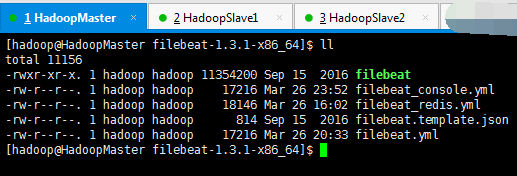

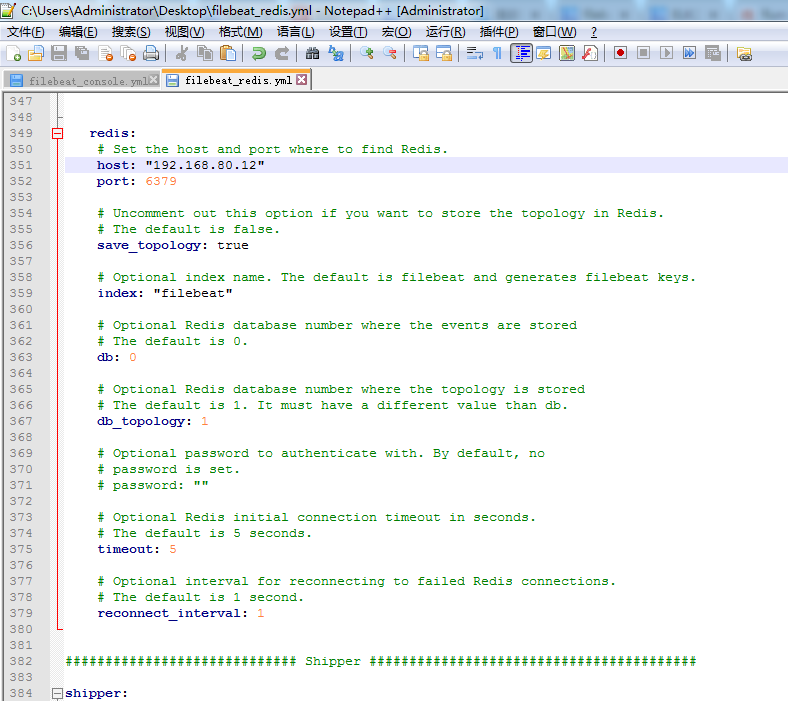
################### Filebeat Configuration Example ######################### ############################# Filebeat ######################################
filebeat:
# List of prospectors to fetch data.
prospectors:
# Each - is a prospector. Below are the prospector specific configurations
-
# Paths that should be crawled and fetched. Glob based paths.
# To fetch all ".log" files from a specific level of subdirectories
# /var/log/*/*.log can be used.
# For each file found under this path, a harvester is started.
# Make sure not file is defined twice as this can lead to unexpected behaviour.
paths:
- /home/hadoop/app.log
#- c:\programdata\elasticsearch\logs\* # Configure the file encoding for reading files with international characters
# following the W3C recommendation for HTML5 (http://www.w3.org/TR/encoding).
# Some sample encodings:
# plain, utf-8, utf-16be-bom, utf-16be, utf-16le, big5, gb18030, gbk,
# hz-gb-2312, euc-kr, euc-jp, iso-2022-jp, shift-jis, ...
#encoding: plain # Type of the files. Based on this the way the file is read is decided.
# The different types cannot be mixed in one prospector
#
# Possible options are:
# * log: Reads every line of the log file (default)
# * stdin: Reads the standard in
input_type: log # Exclude lines. A list of regular expressions to match. It drops the lines that are
# matching any regular expression from the list. The include_lines is called before
# exclude_lines. By default, no lines are dropped.
# exclude_lines: ["^DBG"] # Include lines. A list of regular expressions to match. It exports the lines that are
# matching any regular expression from the list. The include_lines is called before
# exclude_lines. By default, all the lines are exported.
# include_lines: ["^ERR", "^WARN"] # Exclude files. A list of regular expressions to match. Filebeat drops the files that
# are matching any regular expression from the list. By default, no files are dropped.
# exclude_files: [".gz$"] # Optional additional fields. These field can be freely picked
# to add additional information to the crawled log files for filtering
#fields:
# level: debug
# review: 1 # Set to true to store the additional fields as top level fields instead
# of under the "fields" sub-dictionary. In case of name conflicts with the
# fields added by Filebeat itself, the custom fields overwrite the default
# fields.
#fields_under_root: false # Ignore files which were modified more then the defined timespan in the past.
# In case all files on your system must be read you can set this value very large.
# Time strings like 2h (2 hours), 5m (5 minutes) can be used.
#ignore_older: 0 # Close older closes the file handler for which were not modified
# for longer then close_older
# Time strings like 2h (2 hours), 5m (5 minutes) can be used.
#close_older: 1h # Type to be published in the 'type' field. For Elasticsearch output,
# the type defines the document type these entries should be stored
# in. Default: log
#document_type: log # Scan frequency in seconds.
# How often these files should be checked for changes. In case it is set
# to 0s, it is done as often as possible. Default: 10s
#scan_frequency: 10s # Defines the buffer size every harvester uses when fetching the file
#harvester_buffer_size: 16384 # Maximum number of bytes a single log event can have
# All bytes after max_bytes are discarded and not sent. The default is 10MB.
# This is especially useful for multiline log messages which can get large.
#max_bytes: 10485760 # Mutiline can be used for log messages spanning multiple lines. This is common
# for Java Stack Traces or C-Line Continuation
#multiline: # The regexp Pattern that has to be matched. The example pattern matches all lines starting with [
#pattern: ^\[ # Defines if the pattern set under pattern should be negated or not. Default is false.
#negate: false # Match can be set to "after" or "before". It is used to define if lines should be append to a pattern
# that was (not) matched before or after or as long as a pattern is not matched based on negate.
# Note: After is the equivalent to previous and before is the equivalent to to next in Logstash
#match: after # The maximum number of lines that are combined to one event.
# In case there are more the max_lines the additional lines are discarded.
# Default is 500
#max_lines: 500 # After the defined timeout, an multiline event is sent even if no new pattern was found to start a new event
# Default is 5s.
#timeout: 5s # Setting tail_files to true means filebeat starts readding new files at the end
# instead of the beginning. If this is used in combination with log rotation
# this can mean that the first entries of a new file are skipped.
#tail_files: false # Backoff values define how agressively filebeat crawls new files for updates
# The default values can be used in most cases. Backoff defines how long it is waited
# to check a file again after EOF is reached. Default is 1s which means the file
# is checked every second if new lines were added. This leads to a near real time crawling.
# Every time a new line appears, backoff is reset to the initial value.
#backoff: 1s # Max backoff defines what the maximum backoff time is. After having backed off multiple times
# from checking the files, the waiting time will never exceed max_backoff idenependent of the
# backoff factor. Having it set to 10s means in the worst case a new line can be added to a log
# file after having backed off multiple times, it takes a maximum of 10s to read the new line
#max_backoff: 10s # The backoff factor defines how fast the algorithm backs off. The bigger the backoff factor,
# the faster the max_backoff value is reached. If this value is set to 1, no backoff will happen.
# The backoff value will be multiplied each time with the backoff_factor until max_backoff is reached
#backoff_factor: 2 # This option closes a file, as soon as the file name changes.
# This config option is recommended on windows only. Filebeat keeps the files it's reading open. This can cause
# issues when the file is removed, as the file will not be fully removed until also Filebeat closes
# the reading. Filebeat closes the file handler after ignore_older. During this time no new file with the
# same name can be created. Turning this feature on the other hand can lead to loss of data
# on rotate files. It can happen that after file rotation the beginning of the new
# file is skipped, as the reading starts at the end. We recommend to leave this option on false
# but lower the ignore_older value to release files faster.
#force_close_files: false # Additional prospector
#-
# Configuration to use stdin input
#input_type: stdin # General filebeat configuration options
#
# Event count spool threshold - forces network flush if exceeded
#spool_size: 2048 # Enable async publisher pipeline in filebeat (Experimental!)
#publish_async: false # Defines how often the spooler is flushed. After idle_timeout the spooler is
# Flush even though spool_size is not reached.
#idle_timeout: 5s # Name of the registry file. Per default it is put in the current working
# directory. In case the working directory is changed after when running
# filebeat again, indexing starts from the beginning again.
#registry_file: .filebeat # Full Path to directory with additional prospector configuration files. Each file must end with .yml
# These config files must have the full filebeat config part inside, but only
# the prospector part is processed. All global options like spool_size are ignored.
# The config_dir MUST point to a different directory then where the main filebeat config file is in.
#config_dir: ###############################################################################
############################# Libbeat Config ##################################
# Base config file used by all other beats for using libbeat features ############################# Output ########################################## # Configure what outputs to use when sending the data collected by the beat.
# Multiple outputs may be used.
output: ### Elasticsearch as output
#elasticsearch:
# Array of hosts to connect to.
# Scheme and port can be left out and will be set to the default (http and 9200)
# In case you specify and additional path, the scheme is required: http://localhost:9200/path
# IPv6 addresses should always be defined as: https://[2001:db8::1]:9200
#hosts: ["localhost:9200"] # Optional protocol and basic auth credentials.
#protocol: "https"
#username: "admin"
#password: "s3cr3t" # Number of workers per Elasticsearch host.
#worker: 1 # Optional index name. The default is "filebeat" and generates
# [filebeat-]YYYY.MM.DD keys.
#index: "filebeat" # A template is used to set the mapping in Elasticsearch
# By default template loading is disabled and no template is loaded.
# These settings can be adjusted to load your own template or overwrite existing ones
#template: # Template name. By default the template name is filebeat.
#name: "filebeat" # Path to template file
#path: "filebeat.template.json" # Overwrite existing template
#overwrite: false # Optional HTTP Path
#path: "/elasticsearch" # Proxy server url
#proxy_url: http://proxy:3128 # The number of times a particular Elasticsearch index operation is attempted. If
# the indexing operation doesn't succeed after this many retries, the events are
# dropped. The default is 3.
#max_retries: 3 # The maximum number of events to bulk in a single Elasticsearch bulk API index request.
# The default is 50.
#bulk_max_size: 50 # Configure http request timeout before failing an request to Elasticsearch.
#timeout: 90 # The number of seconds to wait for new events between two bulk API index requests.
# If `bulk_max_size` is reached before this interval expires, addition bulk index
# requests are made.
#flush_interval: 1 # Boolean that sets if the topology is kept in Elasticsearch. The default is
# false. This option makes sense only for Packetbeat.
#save_topology: false # The time to live in seconds for the topology information that is stored in
# Elasticsearch. The default is 15 seconds.
#topology_expire: 15 # tls configuration. By default is off.
#tls:
# List of root certificates for HTTPS server verifications
#certificate_authorities: ["/etc/pki/root/ca.pem"] # Certificate for TLS client authentication
#certificate: "/etc/pki/client/cert.pem" # Client Certificate Key
#certificate_key: "/etc/pki/client/cert.key" # Controls whether the client verifies server certificates and host name.
# If insecure is set to true, all server host names and certificates will be
# accepted. In this mode TLS based connections are susceptible to
# man-in-the-middle attacks. Use only for testing.
#insecure: true # Configure cipher suites to be used for TLS connections
#cipher_suites: [] # Configure curve types for ECDHE based cipher suites
#curve_types: [] # Configure minimum TLS version allowed for connection to logstash
#min_version: 1.0 # Configure maximum TLS version allowed for connection to logstash
#max_version: 1.2 ### Logstash as output
#logstash:
# The Logstash hosts
#hosts: ["localhost:5044"] # Number of workers per Logstash host.
#worker: 1 # The maximum number of events to bulk into a single batch window. The
# default is 2048.
#bulk_max_size: 2048 # Set gzip compression level.
#compression_level: 3 # Optional load balance the events between the Logstash hosts
#loadbalance: true # Optional index name. The default index name depends on the each beat.
# For Packetbeat, the default is set to packetbeat, for Topbeat
# top topbeat and for Filebeat to filebeat.
#index: filebeat # Optional TLS. By default is off.
#tls:
# List of root certificates for HTTPS server verifications
#certificate_authorities: ["/etc/pki/root/ca.pem"] # Certificate for TLS client authentication
#certificate: "/etc/pki/client/cert.pem" # Client Certificate Key
#certificate_key: "/etc/pki/client/cert.key" # Controls whether the client verifies server certificates and host name.
# If insecure is set to true, all server host names and certificates will be
# accepted. In this mode TLS based connections are susceptible to
# man-in-the-middle attacks. Use only for testing.
#insecure: true # Configure cipher suites to be used for TLS connections
#cipher_suites: [] # Configure curve types for ECDHE based cipher suites
#curve_types: [] ### File as output
#file:
# Path to the directory where to save the generated files. The option is mandatory.
#path: "/tmp/filebeat" # Name of the generated files. The default is `filebeat` and it generates files: `filebeat`, `filebeat.1`, `filebeat.2`, etc.
#filename: filebeat # Maximum size in kilobytes of each file. When this size is reached, the files are
# rotated. The default value is 10 MB.
#rotate_every_kb: 10000 # Maximum number of files under path. When this number of files is reached, the
# oldest file is deleted and the rest are shifted from last to first. The default
# is 7 files.
#number_of_files: 7 ### Console output
#console:
# Pretty print json event
#pretty: false redis:
# Set the host and port where to find Redis.
host: "192.168.80.12"
port: 6379 # Uncomment out this option if you want to store the topology in Redis.
# The default is false.
save_topology: true # Optional index name. The default is filebeat and generates filebeat keys.
index: "filebeat" # Optional Redis database number where the events are stored
# The default is 0.
db: 0 # Optional Redis database number where the topology is stored
# The default is 1. It must have a different value than db.
db_topology: 1 # Optional password to authenticate with. By default, no
# password is set.
# password: "" # Optional Redis initial connection timeout in seconds.
# The default is 5 seconds.
timeout: 5 # Optional interval for reconnecting to failed Redis connections.
# The default is 1 second.
reconnect_interval: 1 ############################# Shipper ######################################### shipper:
# The name of the shipper that publishes the network data. It can be used to group
# all the transactions sent by a single shipper in the web interface.
# If this options is not defined, the hostname is used.
#name: # The tags of the shipper are included in their own field with each
# transaction published. Tags make it easy to group servers by different
# logical properties.
#tags: ["service-X", "web-tier"] # Uncomment the following if you want to ignore transactions created
# by the server on which the shipper is installed. This option is useful
# to remove duplicates if shippers are installed on multiple servers.
#ignore_outgoing: true # How often (in seconds) shippers are publishing their IPs to the topology map.
# The default is 10 seconds.
#refresh_topology_freq: 10 # Expiration time (in seconds) of the IPs published by a shipper to the topology map.
# All the IPs will be deleted afterwards. Note, that the value must be higher than
# refresh_topology_freq. The default is 15 seconds.
#topology_expire: 15 # Internal queue size for single events in processing pipeline
#queue_size: 1000 # Configure local GeoIP database support.
# If no paths are not configured geoip is disabled.
#geoip:
#paths:
# - "/usr/share/GeoIP/GeoLiteCity.dat"
# - "/usr/local/var/GeoIP/GeoLiteCity.dat" ############################# Logging ######################################### # There are three options for the log ouput: syslog, file, stderr.
# Under Windos systems, the log files are per default sent to the file output,
# under all other system per default to syslog.
logging: # Send all logging output to syslog. On Windows default is false, otherwise
# default is true.
to_syslog: false # Write all logging output to files. Beats automatically rotate files if rotateeverybytes
# limit is reached.
to_files: true # To enable logging to files, to_files option has to be set to true
files:
# The directory where the log files will written to.
path: /home/hadoop/mybeat # The name of the files where the logs are written to.
name: mybeat # Configure log file size limit. If limit is reached, log file will be
# automatically rotated
rotateeverybytes: 10485760 # = 10MB # Number of rotated log files to keep. Oldest files will be deleted first.
keepfiles: 7 # Enable debug output for selected components. To enable all selectors use ["*"]
# Other available selectors are beat, publish, service
# Multiple selectors can be chained.
#selectors: [ ] # Sets log level. The default log level is error.
# Available log levels are: critical, error, warning, info, debug
level: debug
4、File Output
启动redis
[hadoop@HadoopMaster filebeat-1.3.1-x86_64]$ pwd
/home/hadoop/app/filebeat-1.3.1-x86_64
[hadoop@HadoopMaster filebeat-1.3.1-x86_64]$ ./filebeat -c filebeat_file.yml
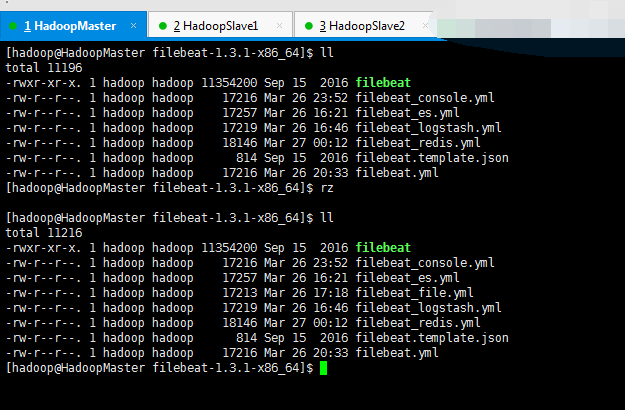
我这里,就以官网,提供的默认路径了,当然自己可以修改。
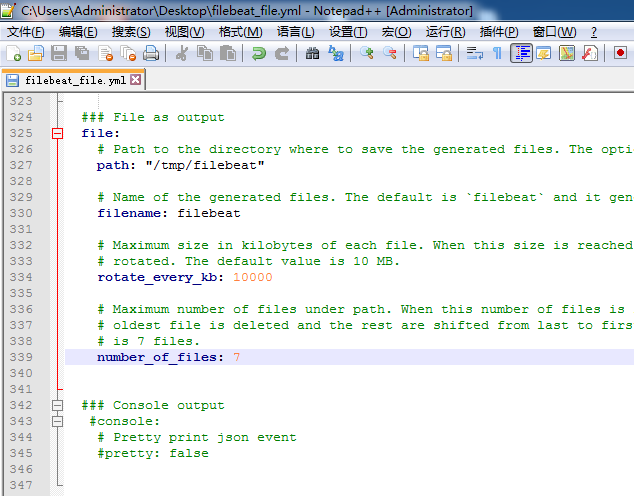
################### Filebeat Configuration Example ######################### ############################# Filebeat ######################################
filebeat:
# List of prospectors to fetch data.
prospectors:
# Each - is a prospector. Below are the prospector specific configurations
-
# Paths that should be crawled and fetched. Glob based paths.
# To fetch all ".log" files from a specific level of subdirectories
# /var/log/*/*.log can be used.
# For each file found under this path, a harvester is started.
# Make sure not file is defined twice as this can lead to unexpected behaviour.
paths:
- /home/hadoop/app.log
#- c:\programdata\elasticsearch\logs\* # Configure the file encoding for reading files with international characters
# following the W3C recommendation for HTML5 (http://www.w3.org/TR/encoding).
# Some sample encodings:
# plain, utf-8, utf-16be-bom, utf-16be, utf-16le, big5, gb18030, gbk,
# hz-gb-2312, euc-kr, euc-jp, iso-2022-jp, shift-jis, ...
#encoding: plain # Type of the files. Based on this the way the file is read is decided.
# The different types cannot be mixed in one prospector
#
# Possible options are:
# * log: Reads every line of the log file (default)
# * stdin: Reads the standard in
input_type: log # Exclude lines. A list of regular expressions to match. It drops the lines that are
# matching any regular expression from the list. The include_lines is called before
# exclude_lines. By default, no lines are dropped.
# exclude_lines: ["^DBG"] # Include lines. A list of regular expressions to match. It exports the lines that are
# matching any regular expression from the list. The include_lines is called before
# exclude_lines. By default, all the lines are exported.
# include_lines: ["^ERR", "^WARN"] # Exclude files. A list of regular expressions to match. Filebeat drops the files that
# are matching any regular expression from the list. By default, no files are dropped.
# exclude_files: [".gz$"] # Optional additional fields. These field can be freely picked
# to add additional information to the crawled log files for filtering
#fields:
# level: debug
# review: 1 # Set to true to store the additional fields as top level fields instead
# of under the "fields" sub-dictionary. In case of name conflicts with the
# fields added by Filebeat itself, the custom fields overwrite the default
# fields.
#fields_under_root: false # Ignore files which were modified more then the defined timespan in the past.
# In case all files on your system must be read you can set this value very large.
# Time strings like 2h (2 hours), 5m (5 minutes) can be used.
#ignore_older: 0 # Close older closes the file handler for which were not modified
# for longer then close_older
# Time strings like 2h (2 hours), 5m (5 minutes) can be used.
#close_older: 1h # Type to be published in the 'type' field. For Elasticsearch output,
# the type defines the document type these entries should be stored
# in. Default: log
#document_type: log # Scan frequency in seconds.
# How often these files should be checked for changes. In case it is set
# to 0s, it is done as often as possible. Default: 10s
#scan_frequency: 10s # Defines the buffer size every harvester uses when fetching the file
#harvester_buffer_size: 16384 # Maximum number of bytes a single log event can have
# All bytes after max_bytes are discarded and not sent. The default is 10MB.
# This is especially useful for multiline log messages which can get large.
#max_bytes: 10485760 # Mutiline can be used for log messages spanning multiple lines. This is common
# for Java Stack Traces or C-Line Continuation
#multiline: # The regexp Pattern that has to be matched. The example pattern matches all lines starting with [
#pattern: ^\[ # Defines if the pattern set under pattern should be negated or not. Default is false.
#negate: false # Match can be set to "after" or "before". It is used to define if lines should be append to a pattern
# that was (not) matched before or after or as long as a pattern is not matched based on negate.
# Note: After is the equivalent to previous and before is the equivalent to to next in Logstash
#match: after # The maximum number of lines that are combined to one event.
# In case there are more the max_lines the additional lines are discarded.
# Default is 500
#max_lines: 500 # After the defined timeout, an multiline event is sent even if no new pattern was found to start a new event
# Default is 5s.
#timeout: 5s # Setting tail_files to true means filebeat starts readding new files at the end
# instead of the beginning. If this is used in combination with log rotation
# this can mean that the first entries of a new file are skipped.
#tail_files: false # Backoff values define how agressively filebeat crawls new files for updates
# The default values can be used in most cases. Backoff defines how long it is waited
# to check a file again after EOF is reached. Default is 1s which means the file
# is checked every second if new lines were added. This leads to a near real time crawling.
# Every time a new line appears, backoff is reset to the initial value.
#backoff: 1s # Max backoff defines what the maximum backoff time is. After having backed off multiple times
# from checking the files, the waiting time will never exceed max_backoff idenependent of the
# backoff factor. Having it set to 10s means in the worst case a new line can be added to a log
# file after having backed off multiple times, it takes a maximum of 10s to read the new line
#max_backoff: 10s # The backoff factor defines how fast the algorithm backs off. The bigger the backoff factor,
# the faster the max_backoff value is reached. If this value is set to 1, no backoff will happen.
# The backoff value will be multiplied each time with the backoff_factor until max_backoff is reached
#backoff_factor: 2 # This option closes a file, as soon as the file name changes.
# This config option is recommended on windows only. Filebeat keeps the files it's reading open. This can cause
# issues when the file is removed, as the file will not be fully removed until also Filebeat closes
# the reading. Filebeat closes the file handler after ignore_older. During this time no new file with the
# same name can be created. Turning this feature on the other hand can lead to loss of data
# on rotate files. It can happen that after file rotation the beginning of the new
# file is skipped, as the reading starts at the end. We recommend to leave this option on false
# but lower the ignore_older value to release files faster.
#force_close_files: false # Additional prospector
#-
# Configuration to use stdin input
#input_type: stdin # General filebeat configuration options
#
# Event count spool threshold - forces network flush if exceeded
#spool_size: 2048 # Enable async publisher pipeline in filebeat (Experimental!)
#publish_async: false # Defines how often the spooler is flushed. After idle_timeout the spooler is
# Flush even though spool_size is not reached.
#idle_timeout: 5s # Name of the registry file. Per default it is put in the current working
# directory. In case the working directory is changed after when running
# filebeat again, indexing starts from the beginning again.
#registry_file: .filebeat # Full Path to directory with additional prospector configuration files. Each file must end with .yml
# These config files must have the full filebeat config part inside, but only
# the prospector part is processed. All global options like spool_size are ignored.
# The config_dir MUST point to a different directory then where the main filebeat config file is in.
#config_dir: ###############################################################################
############################# Libbeat Config ##################################
# Base config file used by all other beats for using libbeat features ############################# Output ########################################## # Configure what outputs to use when sending the data collected by the beat.
# Multiple outputs may be used.
output: ### Elasticsearch as output
#elasticsearch:
# Array of hosts to connect to.
# Scheme and port can be left out and will be set to the default (http and 9200)
# In case you specify and additional path, the scheme is required: http://localhost:9200/path
# IPv6 addresses should always be defined as: https://[2001:db8::1]:9200
#hosts: ["localhost:9200"] # Optional protocol and basic auth credentials.
#protocol: "https"
#username: "admin"
#password: "s3cr3t" # Number of workers per Elasticsearch host.
#worker: 1 # Optional index name. The default is "filebeat" and generates
# [filebeat-]YYYY.MM.DD keys.
#index: "filebeat" # A template is used to set the mapping in Elasticsearch
# By default template loading is disabled and no template is loaded.
# These settings can be adjusted to load your own template or overwrite existing ones
#template: # Template name. By default the template name is filebeat.
#name: "filebeat" # Path to template file
#path: "filebeat.template.json" # Overwrite existing template
#overwrite: false # Optional HTTP Path
#path: "/elasticsearch" # Proxy server url
#proxy_url: http://proxy:3128 # The number of times a particular Elasticsearch index operation is attempted. If
# the indexing operation doesn't succeed after this many retries, the events are
# dropped. The default is 3.
#max_retries: 3 # The maximum number of events to bulk in a single Elasticsearch bulk API index request.
# The default is 50.
#bulk_max_size: 50 # Configure http request timeout before failing an request to Elasticsearch.
#timeout: 90 # The number of seconds to wait for new events between two bulk API index requests.
# If `bulk_max_size` is reached before this interval expires, addition bulk index
# requests are made.
#flush_interval: 1 # Boolean that sets if the topology is kept in Elasticsearch. The default is
# false. This option makes sense only for Packetbeat.
#save_topology: false # The time to live in seconds for the topology information that is stored in
# Elasticsearch. The default is 15 seconds.
#topology_expire: 15 # tls configuration. By default is off.
#tls:
# List of root certificates for HTTPS server verifications
#certificate_authorities: ["/etc/pki/root/ca.pem"] # Certificate for TLS client authentication
#certificate: "/etc/pki/client/cert.pem" # Client Certificate Key
#certificate_key: "/etc/pki/client/cert.key" # Controls whether the client verifies server certificates and host name.
# If insecure is set to true, all server host names and certificates will be
# accepted. In this mode TLS based connections are susceptible to
# man-in-the-middle attacks. Use only for testing.
#insecure: true # Configure cipher suites to be used for TLS connections
#cipher_suites: [] # Configure curve types for ECDHE based cipher suites
#curve_types: [] # Configure minimum TLS version allowed for connection to logstash
#min_version: 1.0 # Configure maximum TLS version allowed for connection to logstash
#max_version: 1.2 ### Logstash as output
#logstash:
# The Logstash hosts
#hosts: ["localhost:5044"] # Number of workers per Logstash host.
#worker: 1 # The maximum number of events to bulk into a single batch window. The
# default is 2048.
#bulk_max_size: 2048 # Set gzip compression level.
#compression_level: 3 # Optional load balance the events between the Logstash hosts
#loadbalance: true # Optional index name. The default index name depends on the each beat.
# For Packetbeat, the default is set to packetbeat, for Topbeat
# top topbeat and for Filebeat to filebeat.
#index: filebeat # Optional TLS. By default is off.
#tls:
# List of root certificates for HTTPS server verifications
#certificate_authorities: ["/etc/pki/root/ca.pem"] # Certificate for TLS client authentication
#certificate: "/etc/pki/client/cert.pem" # Client Certificate Key
#certificate_key: "/etc/pki/client/cert.key" # Controls whether the client verifies server certificates and host name.
# If insecure is set to true, all server host names and certificates will be
# accepted. In this mode TLS based connections are susceptible to
# man-in-the-middle attacks. Use only for testing.
#insecure: true # Configure cipher suites to be used for TLS connections
#cipher_suites: [] # Configure curve types for ECDHE based cipher suites
#curve_types: [] ### File as output
file:
# Path to the directory where to save the generated files. The option is mandatory.
path: "/tmp/filebeat" # Name of the generated files. The default is `filebeat` and it generates files: `filebeat`, `filebeat.1`, `filebeat.2`, etc.
filename: filebeat # Maximum size in kilobytes of each file. When this size is reached, the files are
# rotated. The default value is 10 MB.
rotate_every_kb: 10000 # Maximum number of files under path. When this number of files is reached, the
# oldest file is deleted and the rest are shifted from last to first. The default
# is 7 files.
number_of_files: 7 ### Console output
#console:
# Pretty print json event
#pretty: false ############################# Shipper ######################################### shipper:
# The name of the shipper that publishes the network data. It can be used to group
# all the transactions sent by a single shipper in the web interface.
# If this options is not defined, the hostname is used.
#name: # The tags of the shipper are included in their own field with each
# transaction published. Tags make it easy to group servers by different
# logical properties.
#tags: ["service-X", "web-tier"] # Uncomment the following if you want to ignore transactions created
# by the server on which the shipper is installed. This option is useful
# to remove duplicates if shippers are installed on multiple servers.
#ignore_outgoing: true # How often (in seconds) shippers are publishing their IPs to the topology map.
# The default is 10 seconds.
#refresh_topology_freq: 10 # Expiration time (in seconds) of the IPs published by a shipper to the topology map.
# All the IPs will be deleted afterwards. Note, that the value must be higher than
# refresh_topology_freq. The default is 15 seconds.
#topology_expire: 15 # Internal queue size for single events in processing pipeline
#queue_size: 1000 # Configure local GeoIP database support.
# If no paths are not configured geoip is disabled.
#geoip:
#paths:
# - "/usr/share/GeoIP/GeoLiteCity.dat"
# - "/usr/local/var/GeoIP/GeoLiteCity.dat" ############################# Logging ######################################### # There are three options for the log ouput: syslog, file, stderr.
# Under Windos systems, the log files are per default sent to the file output,
# under all other system per default to syslog.
logging: # Send all logging output to syslog. On Windows default is false, otherwise
# default is true.
to_syslog: false # Write all logging output to files. Beats automatically rotate files if rotateeverybytes
# limit is reached.
to_files: true # To enable logging to files, to_files option has to be set to true
files:
# The directory where the log files will written to.
path: /home/hadoop/mybeat # The name of the files where the logs are written to.
name: mybeat # Configure log file size limit. If limit is reached, log file will be
# automatically rotated
rotateeverybytes: 10485760 # = 10MB # Number of rotated log files to keep. Oldest files will be deleted first.
keepfiles: 7 # Enable debug output for selected components. To enable all selectors use ["*"]
# Other available selectors are beat, publish, service
# Multiple selectors can be chained.
#selectors: [ ] # Sets log level. The default log level is error.
# Available log levels are: critical, error, warning, info, debug
level: debug
5、Console Output (Filebeat收集到数据,输出到console里。为了测试,默认的配置文件里是有的)
启动redis
[hadoop@HadoopMaster filebeat-1.3.1-x86_64]$ pwd
/home/hadoop/app/filebeat-1.3.1-x86_64
[hadoop@HadoopMaster filebeat-1.3.1-x86_64]$ ./filebeat -c filebeat_console.yml




最终的filebeat_console.yml(我自己改名的,为了区别和方便)
################### Filebeat Configuration Example ######################### ############################# Filebeat ######################################
filebeat:
# List of prospectors to fetch data.
prospectors:
# Each - is a prospector. Below are the prospector specific configurations
-
# Paths that should be crawled and fetched. Glob based paths.
# To fetch all ".log" files from a specific level of subdirectories
# /var/log/*/*.log can be used.
# For each file found under this path, a harvester is started.
# Make sure not file is defined twice as this can lead to unexpected behaviour.
paths:
- /home/hadoop/app.log
#- c:\programdata\elasticsearch\logs\* # Configure the file encoding for reading files with international characters
# following the W3C recommendation for HTML5 (http://www.w3.org/TR/encoding).
# Some sample encodings:
# plain, utf-8, utf-16be-bom, utf-16be, utf-16le, big5, gb18030, gbk,
# hz-gb-2312, euc-kr, euc-jp, iso-2022-jp, shift-jis, ...
#encoding: plain # Type of the files. Based on this the way the file is read is decided.
# The different types cannot be mixed in one prospector
#
# Possible options are:
# * log: Reads every line of the log file (default)
# * stdin: Reads the standard in
input_type: log # Exclude lines. A list of regular expressions to match. It drops the lines that are
# matching any regular expression from the list. The include_lines is called before
# exclude_lines. By default, no lines are dropped.
# exclude_lines: ["^DBG"] # Include lines. A list of regular expressions to match. It exports the lines that are
# matching any regular expression from the list. The include_lines is called before
# exclude_lines. By default, all the lines are exported.
# include_lines: ["^ERR", "^WARN"] # Exclude files. A list of regular expressions to match. Filebeat drops the files that
# are matching any regular expression from the list. By default, no files are dropped.
# exclude_files: [".gz$"] # Optional additional fields. These field can be freely picked
# to add additional information to the crawled log files for filtering
#fields:
# level: debug
# review: 1 # Set to true to store the additional fields as top level fields instead
# of under the "fields" sub-dictionary. In case of name conflicts with the
# fields added by Filebeat itself, the custom fields overwrite the default
# fields.
#fields_under_root: false # Ignore files which were modified more then the defined timespan in the past.
# In case all files on your system must be read you can set this value very large.
# Time strings like 2h (2 hours), 5m (5 minutes) can be used.
#ignore_older: 0 # Close older closes the file handler for which were not modified
# for longer then close_older
# Time strings like 2h (2 hours), 5m (5 minutes) can be used.
#close_older: 1h # Type to be published in the 'type' field. For Elasticsearch output,
# the type defines the document type these entries should be stored
# in. Default: log
#document_type: log # Scan frequency in seconds.
# How often these files should be checked for changes. In case it is set
# to 0s, it is done as often as possible. Default: 10s
#scan_frequency: 10s # Defines the buffer size every harvester uses when fetching the file
#harvester_buffer_size: 16384 # Maximum number of bytes a single log event can have
# All bytes after max_bytes are discarded and not sent. The default is 10MB.
# This is especially useful for multiline log messages which can get large.
#max_bytes: 10485760 # Mutiline can be used for log messages spanning multiple lines. This is common
# for Java Stack Traces or C-Line Continuation
#multiline: # The regexp Pattern that has to be matched. The example pattern matches all lines starting with [
#pattern: ^\[ # Defines if the pattern set under pattern should be negated or not. Default is false.
#negate: false # Match can be set to "after" or "before". It is used to define if lines should be append to a pattern
# that was (not) matched before or after or as long as a pattern is not matched based on negate.
# Note: After is the equivalent to previous and before is the equivalent to to next in Logstash
#match: after # The maximum number of lines that are combined to one event.
# In case there are more the max_lines the additional lines are discarded.
# Default is 500
#max_lines: 500 # After the defined timeout, an multiline event is sent even if no new pattern was found to start a new event
# Default is 5s.
#timeout: 5s # Setting tail_files to true means filebeat starts readding new files at the end
# instead of the beginning. If this is used in combination with log rotation
# this can mean that the first entries of a new file are skipped.
#tail_files: false # Backoff values define how agressively filebeat crawls new files for updates
# The default values can be used in most cases. Backoff defines how long it is waited
# to check a file again after EOF is reached. Default is 1s which means the file
# is checked every second if new lines were added. This leads to a near real time crawling.
# Every time a new line appears, backoff is reset to the initial value.
#backoff: 1s # Max backoff defines what the maximum backoff time is. After having backed off multiple times
# from checking the files, the waiting time will never exceed max_backoff idenependent of the
# backoff factor. Having it set to 10s means in the worst case a new line can be added to a log
# file after having backed off multiple times, it takes a maximum of 10s to read the new line
#max_backoff: 10s # The backoff factor defines how fast the algorithm backs off. The bigger the backoff factor,
# the faster the max_backoff value is reached. If this value is set to 1, no backoff will happen.
# The backoff value will be multiplied each time with the backoff_factor until max_backoff is reached
#backoff_factor: 2 # This option closes a file, as soon as the file name changes.
# This config option is recommended on windows only. Filebeat keeps the files it's reading open. This can cause
# issues when the file is removed, as the file will not be fully removed until also Filebeat closes
# the reading. Filebeat closes the file handler after ignore_older. During this time no new file with the
# same name can be created. Turning this feature on the other hand can lead to loss of data
# on rotate files. It can happen that after file rotation the beginning of the new
# file is skipped, as the reading starts at the end. We recommend to leave this option on false
# but lower the ignore_older value to release files faster.
#force_close_files: false # Additional prospector
#-
# Configuration to use stdin input
#input_type: stdin # General filebeat configuration options
#
# Event count spool threshold - forces network flush if exceeded
#spool_size: 2048 # Enable async publisher pipeline in filebeat (Experimental!)
#publish_async: false # Defines how often the spooler is flushed. After idle_timeout the spooler is
# Flush even though spool_size is not reached.
#idle_timeout: 5s # Name of the registry file. Per default it is put in the current working
# directory. In case the working directory is changed after when running
# filebeat again, indexing starts from the beginning again.
#registry_file: .filebeat # Full Path to directory with additional prospector configuration files. Each file must end with .yml
# These config files must have the full filebeat config part inside, but only
# the prospector part is processed. All global options like spool_size are ignored.
# The config_dir MUST point to a different directory then where the main filebeat config file is in.
#config_dir: ###############################################################################
############################# Libbeat Config ##################################
# Base config file used by all other beats for using libbeat features ############################# Output ########################################## # Configure what outputs to use when sending the data collected by the beat.
# Multiple outputs may be used.
output: ### Elasticsearch as output
#elasticsearch:
# Array of hosts to connect to.
# Scheme and port can be left out and will be set to the default (http and 9200)
# In case you specify and additional path, the scheme is required: http://localhost:9200/path
# IPv6 addresses should always be defined as: https://[2001:db8::1]:9200
#hosts: ["localhost:9200"] # Optional protocol and basic auth credentials.
#protocol: "https"
#username: "admin"
#password: "s3cr3t" # Number of workers per Elasticsearch host.
#worker: 1 # Optional index name. The default is "filebeat" and generates
# [filebeat-]YYYY.MM.DD keys.
#index: "filebeat" # A template is used to set the mapping in Elasticsearch
# By default template loading is disabled and no template is loaded.
# These settings can be adjusted to load your own template or overwrite existing ones
#template: # Template name. By default the template name is filebeat.
#name: "filebeat" # Path to template file
#path: "filebeat.template.json" # Overwrite existing template
#overwrite: false # Optional HTTP Path
#path: "/elasticsearch" # Proxy server url
#proxy_url: http://proxy:3128 # The number of times a particular Elasticsearch index operation is attempted. If
# the indexing operation doesn't succeed after this many retries, the events are
# dropped. The default is 3.
#max_retries: 3 # The maximum number of events to bulk in a single Elasticsearch bulk API index request.
# The default is 50.
#bulk_max_size: 50 # Configure http request timeout before failing an request to Elasticsearch.
#timeout: 90 # The number of seconds to wait for new events between two bulk API index requests.
# If `bulk_max_size` is reached before this interval expires, addition bulk index
# requests are made.
#flush_interval: 1 # Boolean that sets if the topology is kept in Elasticsearch. The default is
# false. This option makes sense only for Packetbeat.
#save_topology: false # The time to live in seconds for the topology information that is stored in
# Elasticsearch. The default is 15 seconds.
#topology_expire: 15 # tls configuration. By default is off.
#tls:
# List of root certificates for HTTPS server verifications
#certificate_authorities: ["/etc/pki/root/ca.pem"] # Certificate for TLS client authentication
#certificate: "/etc/pki/client/cert.pem" # Client Certificate Key
#certificate_key: "/etc/pki/client/cert.key" # Controls whether the client verifies server certificates and host name.
# If insecure is set to true, all server host names and certificates will be
# accepted. In this mode TLS based connections are susceptible to
# man-in-the-middle attacks. Use only for testing.
#insecure: true # Configure cipher suites to be used for TLS connections
#cipher_suites: [] # Configure curve types for ECDHE based cipher suites
#curve_types: [] # Configure minimum TLS version allowed for connection to logstash
#min_version: 1.0 # Configure maximum TLS version allowed for connection to logstash
#max_version: 1.2 ### Logstash as output
#logstash:
# The Logstash hosts
#hosts: ["localhost:5044"] # Number of workers per Logstash host.
#worker: 1 # The maximum number of events to bulk into a single batch window. The
# default is 2048.
#bulk_max_size: 2048 # Set gzip compression level.
#compression_level: 3 # Optional load balance the events between the Logstash hosts
#loadbalance: true # Optional index name. The default index name depends on the each beat.
# For Packetbeat, the default is set to packetbeat, for Topbeat
# top topbeat and for Filebeat to filebeat.
#index: filebeat # Optional TLS. By default is off.
#tls:
# List of root certificates for HTTPS server verifications
#certificate_authorities: ["/etc/pki/root/ca.pem"] # Certificate for TLS client authentication
#certificate: "/etc/pki/client/cert.pem" # Client Certificate Key
#certificate_key: "/etc/pki/client/cert.key" # Controls whether the client verifies server certificates and host name.
# If insecure is set to true, all server host names and certificates will be
# accepted. In this mode TLS based connections are susceptible to
# man-in-the-middle attacks. Use only for testing.
#insecure: true # Configure cipher suites to be used for TLS connections
#cipher_suites: [] # Configure curve types for ECDHE based cipher suites
#curve_types: [] ### File as output
#file:
# Path to the directory where to save the generated files. The option is mandatory.
#path: "/tmp/filebeat" # Name of the generated files. The default is `filebeat` and it generates files: `filebeat`, `filebeat.1`, `filebeat.2`, etc.
#filename: filebeat # Maximum size in kilobytes of each file. When this size is reached, the files are
# rotated. The default value is 10 MB.
#rotate_every_kb: 10000 # Maximum number of files under path. When this number of files is reached, the
# oldest file is deleted and the rest are shifted from last to first. The default
# is 7 files.
#number_of_files: 7 ### Console output
console:
# Pretty print json event
pretty: false ############################# Shipper ######################################### shipper:
# The name of the shipper that publishes the network data. It can be used to group
# all the transactions sent by a single shipper in the web interface.
# If this options is not defined, the hostname is used.
#name: # The tags of the shipper are included in their own field with each
# transaction published. Tags make it easy to group servers by different
# logical properties.
#tags: ["service-X", "web-tier"] # Uncomment the following if you want to ignore transactions created
# by the server on which the shipper is installed. This option is useful
# to remove duplicates if shippers are installed on multiple servers.
#ignore_outgoing: true # How often (in seconds) shippers are publishing their IPs to the topology map.
# The default is 10 seconds.
#refresh_topology_freq: 10 # Expiration time (in seconds) of the IPs published by a shipper to the topology map.
# All the IPs will be deleted afterwards. Note, that the value must be higher than
# refresh_topology_freq. The default is 15 seconds.
#topology_expire: 15 # Internal queue size for single events in processing pipeline
#queue_size: 1000 # Configure local GeoIP database support.
# If no paths are not configured geoip is disabled.
#geoip:
#paths:
# - "/usr/share/GeoIP/GeoLiteCity.dat"
# - "/usr/local/var/GeoIP/GeoLiteCity.dat" ############################# Logging ######################################### # There are three options for the log ouput: syslog, file, stderr.
# Under Windos systems, the log files are per default sent to the file output,
# under all other system per default to syslog.
logging: # Send all logging output to syslog. On Windows default is false, otherwise
# default is true.
to_syslog: false # Write all logging output to files. Beats automatically rotate files if rotateeverybytes
# limit is reached.
to_files: true # To enable logging to files, to_files option has to be set to true
files:
# The directory where the log files will written to.
path: /home/hadoop/mybeat # The name of the files where the logs are written to.
name: mybeat # Configure log file size limit. If limit is reached, log file will be
# automatically rotated
rotateeverybytes: 10485760 # = 10MB # Number of rotated log files to keep. Oldest files will be deleted first.
keepfiles: 7 # Enable debug output for selected components. To enable all selectors use ["*"]
# Other available selectors are beat, publish, service
# Multiple selectors can be chained.
#selectors: [ ] # Sets log level. The default log level is error.
# Available log levels are: critical, error, warning, info, debug
level: debug
扩展延伸(进一步建议学习,更贴近生产)

Filebeat之input和output(包含Elasticsearch Output 、Logstash Output、 Redis Output、 File Output和 Console Output)的更多相关文章
- Ubuntu 16.04安装Elasticsearch,Logstash和Kibana(ELK)Filebeat
https://www.howtoing.com/how-to-install-elasticsearch-logstash-and-kibana-elk-stack-on-ubuntu-16-04 ...
- Filebeat-1.3.1安装和设置(图文详解)(多节点的ELK集群安装在一个节点就好)(以Console Output为例)
前期博客 Filebeat的下载(图文讲解) 前提 Elasticsearch-2.4.3的下载(图文详解) Elasticsearch-2.4.3的单节点安装(多种方式图文详解) Elasticse ...
- ELK搭建(filebeat、elasticsearch、logstash、kibana)
ELK部署(文章有点儿长,搭建时请到官网将tar包下载好,按步骤可以完成搭建使用) ELK指的是ElasticSearch.LogStash.Kibana三个开源工具 LogStash是负责数据的收集 ...
- 转载---Beats:如何使用Filebeat将MySQL日志发送到Elasticsearch
在今天的文章中,我们来详细地描述如果使用Filebeat把MySQL的日志信息传输到Elasticsearch中.为了说明问题的方便,我们的测试系统的配置是这样的: 我有一台MacOS机器.在上面我安 ...
- 关于java 日文输出信息到 Jenkins Console Output 乱码问题
java 将从读取到的外部调用程序的带有日文字符的输出信息 输出到Jenkins 上的Console Output 上乱码. 现象分析: Jenkins 上可以将日文正常显示出来,但是读取外部程序的输 ...
- selenium 运行之后错误提示Unable to connect to host 127.0.0.1 on port 7055 after 45000 ms. Firefox console output
错误提示: org.openqa.selenium.firefox.NotConnectedException: Unable to connect to host 127.0.0.1 on port ...
- Docker安装部署ELK教程(Elasticsearch+Kibana+Logstash+Filebeat)
Elasticsearch 是个开源分布式搜索引擎,它的特点有:分布式,零配置,自动发现,索引自动分片,索引副本机制,restful风格接口,多数据源,自动搜索负载等. Logstash 是一个完全开 ...
- No configuration file found and no output filename configured via Cli option.报错
webpack手动配置webpack.config.js文件,打包时出现的报错,可以试试这种解决方案 报错如下: No configuration file found and no output f ...
- webpack 无法打包:No configuration file found and no output filename configured via CLI option
报错内容 No configuration file found and no output filename configured via CLI option.A configuration fi ...
随机推荐
- javascript小白学习指南1---0
第二章 变量和作用域 在看第二章时我希望,你能够回想一下前一次所讲的内容 假设有所遗忘 点这里 今天我们来说说 变量和作用域的问题 本章主要内容 基本类型和引用类型 运行环境 垃圾回收( ...
- java 处理word文档 (含图片,表格内容)
因为本人长期从事Oa相关项目的开发,所以处理word文档,Pdf,Excel等是在所难免的. 1.需求 处理Excel 能够用jxl 或者poi 2需求 用户在系统上填 ...
- Android严苛模式StrictMode使用详解
StrictMode类是Android 2.3 (API 9)引入的一个工具类,可以用来帮助开发者发现代码中的一些不规范的问题,以达到提升应用响应能力的目的.举个例子来说,如果开发者在UI线程中进行了 ...
- 记一次httpclient Connection reset问题定位
问题:某业务系统在运行一段时间后,某个API一定概率偶现Connection reset现象. 问题定位: 首先想到的是要本地复现出这个问题,但一直复现不出来. 1.根据线上问题相关日志判断应该是有部 ...
- 25.内置API
转自:https://www.cnblogs.com/best/tag/Angular/ 3.1.数据转换 示例: 默认情况JavaScript中对象是传引用的: var tom={name:&quo ...
- 在spring-mybatis.xml 中配置pagehelper
maven导包:<dependency> <groupId>org.mybatis</groupId> <artifactId>mybatis</ ...
- HDU 5375 Gray Code 动归
题意:给你一串不确定的二进制码,其对应的格雷码的每一位有对应的权值,问转换成的格雷码的能取到的最大权值是多少. 思路:没有思路,乱搞也AC #pragma comment(linker, " ...
- java httpRequest和Response
Web服务器收到客户端的http请求,会针对每一次请求,分别创建一个用于代表请求的request对象.和代表响应的response对象.request和response对象即然代表请求和响应,那我们要 ...
- 光纤收发器TR-962D/932D的面板指示灯及开关代表的含义?
指示灯含义说明:POWER(绿色):“常亮”表明光纤收发器处于通电状态:LFP指示灯: “常亮”表明LFP功能开启,“常灭”表示LFP功能关闭:FX_LINK/ACT(绿色):“常亮”表明光纤端口连接 ...
- 紫书 习题 10-44 UVa 11246 ( 容斥原理)
把k的倍数的删去(k, 2k, 3k--),但是k^2不应该删去,因为k已经删去,所以不存在某个数乘上k之后为k^2 所以k^2可以留下,然后因为有k^2,所以k^3就是k^2的k倍,所以k^3要删去 ...
